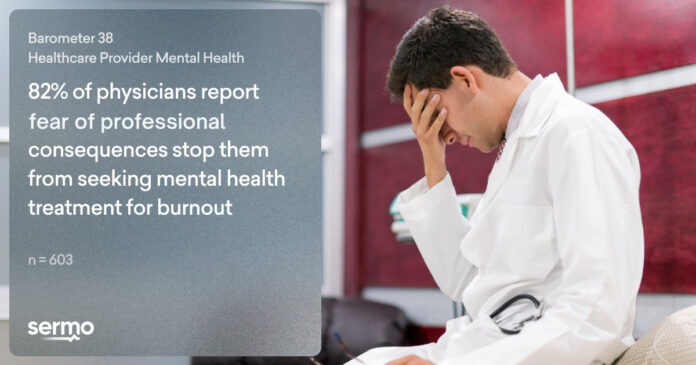NEW YORK– A new survey by Sermo, a global healthcare engagement platform, has revealed that 82% of physicians hesitate to seek mental health treatment for burnout due to fears of professional consequences. The concern is even greater among psychiatrists, with 95% citing career-related fears as a barrier to seeking support.
The findings, part of the 38th Sermo Barometer survey, highlight the ongoing impact of the COVID-19 pandemic on physicians. While burnout peaked during the height of the pandemic, it remains a widespread issue, with 75% of surveyed doctors reporting they have witnessed a colleague experiencing burnout in the past three months.
The survey, which polled more than 600 global healthcare professionals across multiple specialties, identified administrative workload as the leading contributor to physician burnout. Sixty-seven percent of respondents said reducing administrative burdens should be a top priority, while 56% stressed the need for flexible work arrangements to improve work-life balance.
Dr. Zachary Horne, a radiation oncologist at Allegheny Health Network Cancer Institute and a Sermo Medical Advisory Board member, emphasized the need for systemic change. “As physicians, we are our best advocates, and we need to protect ourselves. We enter this profession to care for people, but we must also set boundaries and work alongside administrators to create sustainable solutions,” Horne said.
Physician burnout has significant consequences for patient care. The survey found that 42% of doctors admitted feeling less empathetic toward patients, while 45% reported reducing communication outside of scheduled appointments. These trends suggest a decline in the doctor-patient relationship, potentially leading to worse health outcomes.
The survey also found that “quiet quitting” is becoming a growing concern among physicians, with 79% believing that health systems are not effectively addressing the issue. Many doctors are disengaging from non-clinical responsibilities as a way to cope with burnout:
- 43% have minimized documentation efforts.
- 37% have reduced patient hours.
- 43% have declined leadership roles.
- 37% have avoided professional development opportunities.
- Only 22% have taken more time off despite experiencing burnout.
Dr. Horne advocates for technological solutions, including artificial intelligence, to help alleviate the documentation burden. “If AI-driven tools could reduce administrative tasks that take 15 to 20 minutes per patient, we could make real progress in combating burnout while maintaining quality care,” he said.
While some progress has been made—such as more than half of U.S. states removing licensing questions about mental health treatment—significant barriers remain. The survey emphasized the need for confidential mental health support programs, administrative reform, and flexible scheduling to help alleviate burnout.
The survey, conducted March 10-11, 2025, included healthcare professionals from a range of specialties, including cardiology, dermatology, endocrinology, gastroenterology, family practice, neurology, obstetrics and gynecology, oncology, pediatrics, and psychiatry. The results underscore the urgent need for systemic reforms to protect both physician well-being and patient care.



